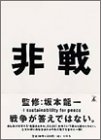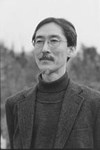 |
|
 |

 |


Yamada: |
Tropical rain forests are now rapidly dwindling and some people say that undiscovered medicines that could be effective against cancer or AIDS in the future may be buried among them. There may still be treasures for the human society like the Iroquoian democracy buried among almost unknown indigenous cultures.
|
Hoshikawa: |
There are not only East and West, but also North and South in the world. We should not forget the native cultures and indigenous cultures in the South.
|
Yamada: |
Is the "South" where we should learn the wisdom to live in harmony with nature?
|
Hoshikawa: |
Yes, first of all, we should learn to live without destroying nature. There is an interesting episode in "The Walking People." A people that builds pyramids and seems to have migrated from Central America encounter the clan of "The Walking People" that transmits what is learned to the next generation single-mindedly. After working under the people to build a pyramid for several years, the clan from Asia fled, saying "I give up." They could not stand that people were divided into those who give instructions and those who just work under those instructions, and building a large structure that is meaningless to many. After reading this story, I noticed the difference between cultures that leave something and those that leave nothing.
|
Yamada: |
At first glance, a society in which everybody talks on equal terms cannot leave anything important because the power is not concentrated.
|
Hoshikawa: |
I think that is the heritage of native Americans, who maintained the Jomon culture of the Mongoloid until recently. While they have lived with nature that seems untouched for thousands of years, they have left almost nothing materially. Instead, they built such a democratic society as to be taken as a model by settlers from Europe and the spirituality that supported the society.
|
Yamada: |
Still, untouched nature is more valuable than pyramids.
|
Hoshikawa: |
They also included natural living things in the circle of equal partners as well, calling them "citizens with wings," "citizens swimming in water," and "citizens with roots." So, their democracy may be a democracy that includes all life. They have accumulated wisdom and techniques so that every creature in the large circle of life can get along together.
|
Yamada: |
If so, people of today who squander a gigantic amount of energy in wars are still immature.
|
Hoshikawa: |
It might be necessary for us to think over whether those who assume to be the most advanced could actually be the most savage and primitive.
|
Yamada: |
In that sense, you have questioned the stance of the US in shaking its fist after September 11. (*4)
|
Hoshikawa: |
Under no circumstances is an indiscriminate terrorist attack forgiven. But as a problem becomes larger and more deep-rooted, determined discussions a la Iroquois and agreements by reason are increasingly required. Since it is also effective for foreign countries to advertise their appeals in US newspapers, I introduced letters of the September 11 bereaved appealing to US President Bush "We want no retaliation" before the Afghan attacks. More we recently reported casualties caused by depleted uranium weapons used by the US armed forces in the Gulf War, and cooperated in an opinion ad to convey the voice of the Japanese people to rethink a war on Iraq. (*5) (*6)
|
Yamada: |
The dangers of depleted uranium are not well-known. Some people think that they simply consist of waste from nuclear weapons or atomic power plants.
|
Hoshikawa: |
It's a radioactive substance whose half-life is 4.5 billion years. Since its specific gravity is twice that of iron, the penetration distance is increased if it is loaded in the warhead. It is said that up to 800 tons of depleted uranium weapons were used in the Gulf War. When the target is hit, the material burns and is scattered around. Thus, radiation hazards such as cancer and leukemia are reported to have increased dramatically among Iraqi children. (*5)
|
Yamada: |
In the Gulf War, Japan contributed more that 1.5 trillion yen. It's hard to believe that such a thing actually happened with contributions from Japan!!
|
Hoshikawa: |
According to a rough calculation by Professor Yagasaki of Ryukyu University, 14,000 to 36,000 times the radioactivity of the Hiroshima-type atomic bomb was scattered in the Middle East. It may be Japan's role in the 21st century to keep the pledge of Article 9 of the Japanese Constitution "never to use armed force as a means of resolving international disputes" and to appeal to the world to "return to the basics of democracy to talk with each other comprehensively."
|
Yamada: |
I agree with you.
|
|
 |
*1
"Pacific Rim Internet Travel"
Wisdom of Mongoloid aborigines
Written by Jun Hoshikawa NTT Publishing
The sources of the spirits of native cultures on the North and South American continents and Oceania from the ancient times are traced, and the near future are predicted. |
 |
*2
"Addicted to War"
Why the U.S. Can't
Kick Militarism
Written by Joel Andreas
Translation supervised by Yumi Kikuchi
Translated by volunteers of the Global Peace Campaign Godo-shuppan
The real face of the US in which war grew out of the public works projects ranging from persecution of native Americans to imperialistic behavior after the Cold War |
 |
*3
"Great Wisdom in a Small Country"
Written by Paula Underwood/Jun Hoshikawa Shoeisha
Historical secrets of the founding of the USA transmitted from the native Americans and visits of members of the contemporary Iroquois Federation |
 |
*4
"Renunciation of War"
Supervised by Ryuichi Sakamoto + sustainability for peace
Gentosha
Enthusiastic, yet sensible voices collected from around the world by making full use of the Internet just after September 11 |
 |
*5
Testimony of the former inspector for weapons of mass destruction
of the United Nations, Scott Ritter
"War on Iraq"
What Team Bush Doesn't Want You to Know
Written by William Rivers Pitt +
Scott Ritter
Translated by Jun Hoshikawa
Godo-shuppan
Based on seven years of inspection experience and data, the folly of attacking Iraq by force is stressed.
*6
Global Peace Campaign
http://www.peace2001.org/
Action site full of information that could change the world |

|
Jun Hoshikawa
Born in 1952 in Tokyo. Jun Hoshikawa, a writer and translator, has lived on Yaku Island since 1982. He has written "Earth Sense" (Kosakusha), "Earth Life" (Heibonsha Library), and "Praise of Water on Yaku Island" (Minami Nippon Shimbun). He has translated many books including "The Ages of Gaia" by James Lovelock (Kosakusha), "Earth Sense Revolution" by Jeremy Rifkin (Diamond), and "Three Strands in the Braid: A Guide for Enablers of Learning (Three Learning Stories Ser.)" by Paula Underwood (Tokuma Shoten Publishing).
http://innernetsource.hp.infoseek.co.jp/ |


|
 |





